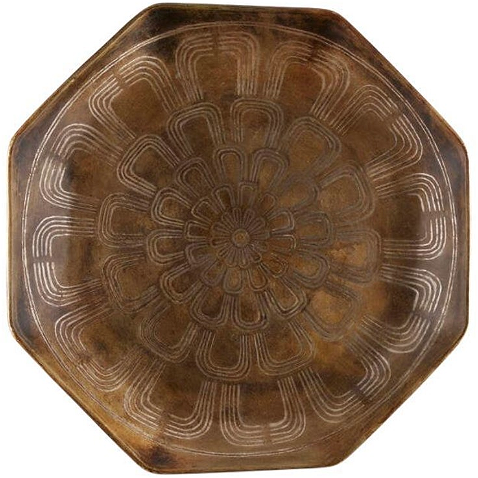NW-66
$22,500
Rare Dinanderie Charger in Patinated Copper and Nickel Silver by Jean Dunand
Rare octogonal dinanderie charger in patinated copper and nickel silver by Jean Dunand. Signed incised: Jean Dunand. France: circa 1925 Provenance : Private collection Chicago literature Jean Dunand His Life And Works by Felix Marcilhac At the age of just nineteen, Jean Dunand (1877-1942) began garnering attention in the Swiss art scene. Thanks to the sale of figurative sculptures that he had created in 1896, he succeeded in winning a scholarship from the city of Geneva which allowed him to study sculpture under Jean Dampt at the École National des arts décoratifs in Paris. With this training, he won a gold medal at the 1900 Exposition Universelle de Paris for his work Quo Vadis and beginning in 1902 his sculptures entered into the collections of Swiss museums. Despite such encouraging beginnings, Dunand soon realized that the medium of the sculptor did not suit him and that gaining notoriety as an artist required innovation. He therefore decided, while continuing to present his sculptures at the Paris salons, to exhibit his works in dinanderie, a technique he had learned at the end of the 1890s from Auguste Dannhauer, a Genevese coppersmith. Encouraged by the public’s interest in these works at the 1904 Salon de la Société Nationale des Beaux-Arts, Dunand decided to abandon sculpture, resolutely turning his attention to the decorative arts, encouraged by his mentor Jean Dampt who always contended that an artist must above all be a craftsman. His vases, boxes and coupes were unanimously praised by the critics and one of his gold-inlaid vases was even acquired by the Union centrale des arts décoratifs de Paris in 1905. Refusing the use of machines to give form to his creations, Dunand used a boxwood mallet to raise sheets of copper, brass, or maillechort from the interior. From a flat sheet, he succeeded in arriving at forms in high relief, entirely hammered in small successive blows like a sculptor, in order to achieve the shape of the desired object. In the beginning, he created simple forms that allowed him to highlight his technique, torch-fired patinas, and precious-metal inlays.
- height
- 1 in.
- diameter
- 13.25 in.
- condition
- Very good original condition and patination
Circa 1925




